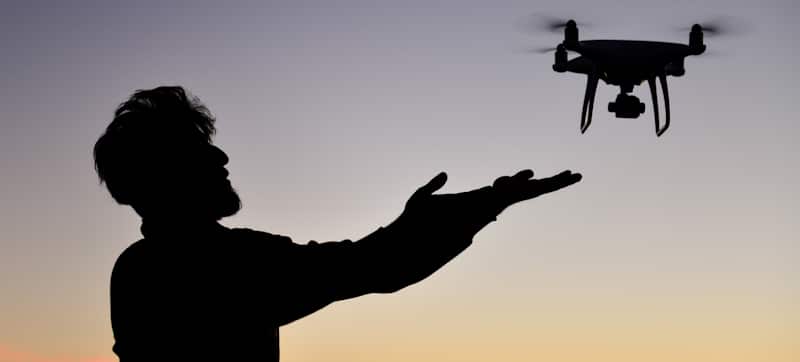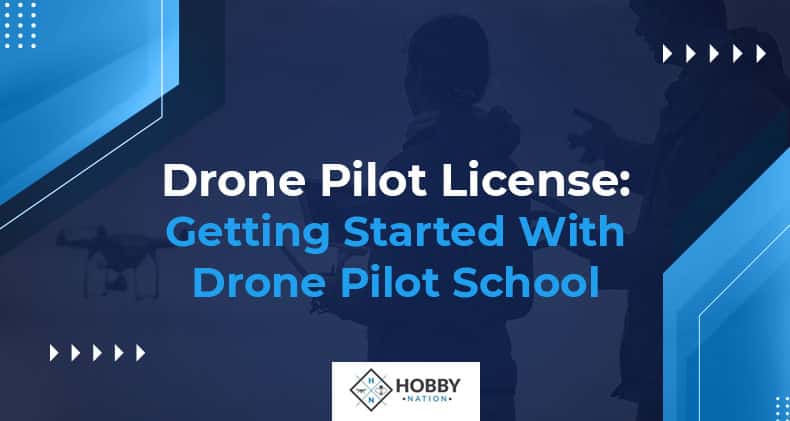Anyone can fly a drone for recreation, but you require a drone pilot license if you hope to use your drone to make some money by flying commercially. The license also gives you the liberty to fly in some areas restricted to recreational drone pilots. You would also need to go to a drone pilot school to achieve this.
To obtain a drone pilot license, you would have to take and pass the Part 107 test, and you must complete an online drone training every two years. You can attend many drone pilot schools to prepare for the Part 107 test—schools like Drone Launch Academy and Master Your Drone.
Getting started as a commercial drone pilot is not as difficult as you may think. As long as you are ready to study hard to pass the Part 107 test, you will have no difficulty getting the license.

Drone Pilot License
In the United States of America, you are required to obtain a drone pilot license when you want to use your drone for business or commercial work. If you want to fly recreationally, you do not need a drone pilot license, but you must take the TRUST (The Recreational UAS Safety Test).
As a commercial drone pilot, there are rules that you must observe when flying your drone. When you register with a drone pilot school, you will learn these rules in addition to how to fly a drone safely. License manned aircraft pilots do not need to take the Part 107 exam to fly a drone commercially.
They only need to go through a training course, Part 107 sUAS (small Unmanned Aircraft Systems), on the Federal Aviation Administration website. After completing the course, the pilot will complete a rating application for the pilot certificate, validate his identity, and after verification and assessment, will receive his certificate.
Before you can receive a drone pilot license to operate a drone commercially, you must meet all these requirements:
- You must sit for and pass the Aeronautical Knowledge Test.
- You must be at least 16 years old.
- You must apply for and obtain a Remote Pilot Certificate.
Some of the topics you would be tested on when you take the drone certification tests are; National Airspace System, Emergency Procedures, FAA Drone Laws, Sectional Chart, Aeronautical Decision-Making, Radio Communications, Airport Operations, Crew Resource Management, Micrometeorology, and Weather, etc.
After obtaining your drone pilot license, here are some things you are expected to do to remain licensed.
- Renew your drone registration every 3 years and have the registration card with you at all times.
- Take and pass a recurring aeronautical knowledge test every 2 years.
- You must be available to submit your drone to the FAA for testing and inspection upon request.
- If there is any property damage or injury during an operation over $500, you must report it to the FAA within 10 days.
- Before flying, you are required to properly inspect your drone to ensure it is safe for operation.
There is a fee you must pay before you can take the Part 107 exam at any FAA-authorized center. The fee is $175, and you will pay it to the testing center where your test is scheduled. In addition to the exam fee, you would have to pay a registration fee of $5 for your drone.
Registration of drones is compulsory for all commercial drone pilots, and the registration lasts for three years before you have to renew it. The process of obtaining a drone pilot license is not as difficult, rigorous, and time-consuming as becoming a certified manned aircraft pilot.
After taking the Part 107 exam, you would have to wait for about 6 to 8 weeks for the Federal Aviation Administration to issue a drone pilot certificate to you. However, if you pass the Part 107 exam, you will be issued a temporary drone pilot license within 10 business days prior to processing the permanent drone pilot certificate.
Do You Need A Pilot License For a Drone?
Pilot licenses are only compulsory if you will fly your drone commercially. As long as you want to use your drone professionally, this is flying your drone to make money, either through photography, surveillance, or videography; you must obtain a pilot license from the Federal Aviation Administration.
Flying drones commercially also involves using the results from the drone operation to conduct any business. For recreational drone pilots, a pilot license is not necessary; however, you must take The Recreational UAS Safety Test (TEST). You are also required to comply will all recreational drone laws, including:
- Do not fly a drone under the influence of alcohol or drugs.
- Maintain a visual line of sight with your drone.
- Fly your drone for recreation only.
- Fly your drone in the Class G airspace (uncontrolled airspace).
- Inscribe your registration number on the body of your drone.
- Pass the Recreational UAS Safety Test and have the proof with you.
How Much Does A Drone Pilot Make A Year?
The drone industry is slowly expanding as more people decide to choose a career as a drone pilot. There are different job opportunities as a drone pilot; you can be a photographer, videographer, surveyor, amongst other opportunities. It is challenging to be specific about the earnings of drone pilots because the industry is still young.
The annual earnings of drone pilots vary and depend on the employer and the work done. The estimated annual earnings of a drone pilot can range from $33,000 to $80,000. Other drone pilots that work as freelancers earn about $200 to $500 for a job; this can be more; it depends on how well the pilot sells his services.

Getting Started With Drone Pilot School
You do not need a formal education to become a drone pilot; all you need to do is register with a drone pilot school, take and pass the Part 107 exam, and wait for your license from the Federal Aviation Administration. What you will learn in a drone pilot school is beyond the operation of drones.
You will learn the drone laws, safety precautions, National Airspace, airport operations, weather, amongst others. The advantage of attending a drone pilot school is that you can fly a drone in any city or state around the United States of America. We will look at some of the most prestigious drone pilot schools you can attend.
Drone Pilot Ground School
This is one of the most popular drone pilot schools; they offer three training in the school;
- General flight training includes the basics of flying a drone and advanced ways of flying a drone.
- Knowledge to pass the Aeronautical Knowledge Test conducted by the Federal Aviation Administration (FAA).
- Industry-specific training on the flight of drones.
The first training is acquiring the basic knowledge required to operate a drone. This lecture starts with using drone flight simulators to improve your flight skills. The next training is learning the requirement to be a commercial drone pilot. Here, you will take lessons needed to meet the FAA requirements.
The final training is acquiring the skills needed to be a professional drone pilot. There are courses for different drone job professions, including surveillance, videography, photography, and public safety.
Other notable drone pilot schools are Drone Launch Academy, Action Drone USA, Master Your Drone, Drone Genuity, UAV Coach, and Clemson University.
Final Thoughts
Becoming a licensed, certified commercial drone pilot is not as difficult as some think it is. It is a simple process; the first thing you need to do is enroll in a drone pilot school to acquire the knowledge required to be a pilot and pass the Part 107 exam. Next, apply for and take the Part 107 exam; wait for your license after passing the exam.
Shawn Manaher loves to play with new toys and dive into new hobbies. As a serial entrepreneur, work definitely comes first but there is always room for hobbies.

